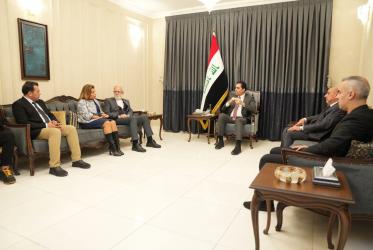Adopted by the Executive Committee, Geneva, 26-29 September 2000.
Recalling the appeal of the WCC Eighth Assembly (Harare, 1998) that negotiations on the future status of Jerusalem should "be undertaken without further delay and considered to be part of rather than a product of a comprehensive settlement for the region;"
Noting that negotiations on the final status on Jerusalem have begun; and
Sharing the conviction expressed by Their Beatitudes the Patriarchs and Heads of Churches and Christian Communities in Jerusalem in their statement of 26 September 2000 "that the political negotiators (must) take all necessary steps to (conclude them in a way that would) best ensure true peace with true justice and security for the two peoples and three religions' of this land - Palestinians and Israelis, Jews, Christians and Muslims alike."
The Executive Committee, meeting in Geneva, 26-29 September 2000:
Expresses its appreciation for the comprehensive analysis of issues related to the present final status negotiations contained in the document, "Background paper on the Status of Jerusalem - December 1998 to the Present," prepared by International Relations staff, and commends it to the churches and ecumenical bodies for study and appropriate action;
Commends the initiatives taken in follow-up to the Statement on the Status of Jerusalem adopted by the Eighth Assembly;
Firmly believes that Jerusalem can be a source of peace, stability and coexistence rather than of division and conflict that destroy human dignity and hope;
Reaffirms the principles contained in that statement as particularly relevant in the context of the present negotiations;
Remains convinced of the urgency of pursuing negotiations on Jerusalem based on these principles;
Encourages the parties to have the courage to abandon narrow, exclusive claims in favour of efforts to build an open, inclusive and shared city where free access to Holy Places and freedom of worship is assured for people of all faiths;
Reiterates its conviction "that the solution to the question of Jerusalem is in the first place the responsibility of the parties directly involved, but that the Christian churches and the Jewish and Muslim religious communities have a central role to play in relation to (the) negotiations;"
Welcomes in this connection the recent initiatives taken by Heads of Churches of Jerusalem and the supportive steps taken by church leaders in the USA; and
Urges all member churches
- to bring the WCC's Eighth Assembly Statement on the Status of Jerusalem to the attention of their governments;
- to speak out boldly and in unison for the application of these principles; and
- to remain constant in prayer and in solidarity with the local churches for a just peace in Jerusalem and for the whole of the Middle East.




